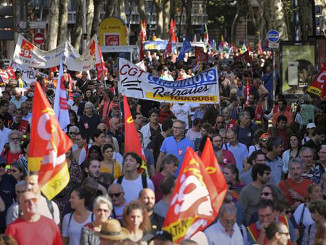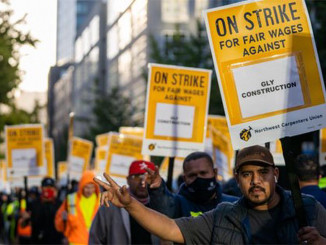download illustrated PDF of this pamphlet
Today many workers feel discouraged looking at the way society is run. The economy and the governmental structure seem so complicated. The seats of power seem omnipotent. These factors can make us feel that social change is impossible.
Also our rich history of heroic struggles by the working class is often hidden from us.
But the past is full of examples of what the working class has done. It is filled with cause for celebration and inspiration.
In 1871 the workers of Paris were “ready to storm heaven,” or so said Karl Marx, the founder of modern communism. He was a great admirer of the heroic and innovative struggles of the workers of Paris. The French workers created the first example of workers’ power–they showed what a government of, for and run by the workers would look like.
How did this incredible change come about? What did the workers do? And what happened to their amazing experiment?
The people of France had a long history of opposing tyranny. It was the French Revolution in 1789 that launched the assault on the European monarchy, which changed the face of the world. Again in 1815, the 1830s, and 1848, the French people battled to defend their interests and challenge their rulers.
In each battle, as they tried to challenge the monarchy, the capitalists called on the workers to fight for them. Each time the workers put forward independent demands, the capitalists turned around and compromised with the old order of French bankers and landlords.
They feared the workers as a threat to their emerging order. So going into 1871, the French workers had both a long tradition of struggle and the experience that gave them an understanding of the need to organize themselves independently as a class.
In the 1860s, there was a severe economic crisis in France. The French workers responded with strikes. They organized labor unions and political clubs. Revolutionary ideas were taking hold. The First International, an organization of workers and revolutionary intellectuals throughout Europe, defended the ideas of workers’ power and socialism. It had 70,000 members in Paris alone, at the time of the Commune.
The French rulers turned to war as a way out of their economic problems and to extend their territory. In 1869, Louis Bonaparte, the French emperor, led France into a war against Prussia. The war was a disaster for the French, who lost battle after battle.
Finally on Sept. 2, 1870, France was defeated and 80,000 French soldiers were forced to surrender to the Prussians. From then on, for five months, Paris was under siege: people were starving had to eat rats and even horses to survive – 60,000 of them died during the siege. with constant bombardments. But the government, followed by some rich citizens fled south to Bordeaux.
In response to this military defeat, an uprising by the people of Paris overthrew the Bonaparte monarchy. A republic was proclaimed in exile, and parties representing the capitalist class were put into power. But the capitalists were not ready to act decisively to save Paris. With the government operating in exile, who would rule Paris? Who would organize the day to day life of the people of the city?
The National Guard Steps Forward
Most workers in Paris had their own guns. They organized themselves into the National Guard on a neighborhood basis. They elected their own officers. They elected delegates to a central governing body, called the Central Committee. In the vacuum created by the defeat of France, they were the only real power in Paris.
The 20 men of the Central Committee organized the defense of the city. They organized the distribution of supplies and paid for the guardsmen, etc.
While the National Guard was busy attending to the day-to-day needs of ordinary people, the new capitalist government was surrendering Paris to Prussia. The capitalists even agreed to allow the victorious Prussians to enter the city as a conquering army. But the National Guard said “no” and organized to back up their words.
On March 18, 1871, the new republican government, in a sneak attack by the French army, tried to retake some of the cannons that the National Guard had distributed around the city to protect Paris from attack. But the working people of Paris, led by women on their early morning shopping errands, blocked their way.
When the French generals gave the order to their troops to fire on the working people of Paris, the army shot the two generals instead and fraternized with the National Guard troops. The soldiers saw the National Guard as their brothers and the generals as their enemies.
After this fiasco, the republican government quickly fled to Versailles, and the red flag was raised over the Paris city hall. The National Assembly of the rich at Versailles tried to pass more laws to crush everyone beneath them. But their plans backfired and turned sections of the middle classes – the shopkeepers, tradesmen, and merchants – into allies of the workers.
The Commune is Born in Action
The National Guard organized elections for the Paris Commune. This was an election like no other before it. There was universal suffrage, with representatives being chosen by district, so people actually knew the candidates.
Ninety representatives were chosen, but quickly the representatives of the ruling class quit. The large majority elected to the Commune were revolutionaries; 24 out of 90 were workers. The average age of the communards was 37 years old, whereas the average age of the government officials at Versailles was 62. The Commune represented the youth and the future.
All those elected were immediately recallable, so no one could serve beyond the point that the electorate wanted them as their representatives. And they were to be paid workers’ wages, not sky-high salaries. No one would get rich off of being a delegate in the Commune. Devotion to the working class, not greed, was what characterized this new body.
The Commune saw itself as a working body – passing the laws but also responsible for carrying them out. There was no passing the buck, no bureaucracy to clog things up. The workers power meant cheap and efficient government whose goal was a better life for working people.
On March 26, 200,000 people came to the Paris city hall for the inauguration of the Commune.
The Commune proclaimed its internationalism and said that workers have no country to defend – only their interests as a class. While at war with Prussia, they chose a German as their minister of labor.
They chose a Pole to serve as the head of the commune’s defense. They tore down the Vendome Column, a monument to the past glory of French imperialism and military ventures. They demanded that those who had benefited from the war should be taxed on their profits.
They abolished the conscription that forced the poor to fight the wars of the rich. They abolished the standing army and police that stood against the population. Instead, neighborhoods would be policed by their own armed population, with officers who were elected by the ranks. They even arrested generals if they had been negligent in their duty towards soldiers.
They elected judges as well who were immediately replaceable if they didn’t serve the popular will. They proclaimed death to those who stole. As a consequence, the gangsters, prostitutes, and thieves ran to Versailles, the center for the rich. Almost all crime stopped in Paris.
What Did the Commune Accomplish?
The Commune immediately tried to make a series of economic decisions to help ordinary people get back on track. The Catholic Church was one of the richest and most powerful French institutions and a pillar of the past royal and feudal structure. The Commune abolished the church budget and confiscated church property, proclaiming it national property. Another decree removed religious symbols from the schools.
Rents had been suspended during the months of German siege, but the capitalist government had tried to reinstate them. The Commune put a moratorium on rents. It spread repayments on loans over three years and proclaimed that the payments would not start until July 15 of that year, with no back interest.
They forbid the sale of items in pawnshops because they knew that the economic crisis had forced many skilled workers to pawn their tools, thus making them unable to work. They ordered the release of all items pawned before April 25.
The Commune established the eight-hour day. They tried to reopen closed workshops and began to regulate wages and contracts. In some workshops, factory councils planned the work and elected their own foremen. They came up with workman’s compensation for stone cutters who performed dangerous work with no insurance. They abolished fines on workers that had been levied if the workers made mistakes. This was truly a government that put the workers’ interests first.
They also brought relief to the bakers who had been forced to work at night so the rich would have fresh croissants in the morning. The Commune felt that the bakers’ sleep and health was worth more than the whims of the rich! Members of the Commune went out to the bakeries to make sure this new rule was enforced and closed down any bakeries that tried to violate it. The Commune was a working, not a talking, body.
Women were active in the Commune. They fought against prostitution, seeing it as the exploitation of women. They argued to do away with the stigma of children who were considered illegitimate. They took care of the wounded and were some of the most determined fighters on the barricades when the Commune came under attack.
The Commune aimed to make education free, compulsory, and secular. They opened a school where workers could get technical training. One school district provided free school materials to poor children. Another provided free clothing and food to school children, knowing that you can’t do well in school if you are hungry or poorly clothed.
Children were active defenders of the Commune. Over 600 children were captured by Versailles troops in the final battles to defend the Commune’s vision of the future.
The Commune opened up culture, formerly the sole property of the wealthy, to ordinary people. They proclaimed that art must be free of government control. They opened up the Louvre Museum, formerly the private museum of the kings, for all to see.
They gave support to contemporary artists. There was an arts council for the Commune that included Corbet, Daumier, and Manet – wellknown French artists of the time. Actors and musicians organized under the Commune.
The Commune opened reading rooms in hospitals to make life more pleasant for those who were sick. They forbade the rich to take books from the library. Paris was filled with people going to theater, concerts, museums, listening to street corner speeches, reading books and the many newspapers that stuffed the news racks. The working class was bursting with life, ideas, and enthusiasm! And all this was happening in a city surrounded by a hostile army and under constant siege.
The Commune Isolated and Under Attack
Attempts were made to create Communes in other major French cities. But elsewhere they lacked the popular support and organizational know-how that existed in Paris. All these attempts were put down by the government of Versailles. This left the Paris Commune in desperate isolation.
The workers were busy redesigning society and creating a new future for humanity. They thought that the Versailles government would leave them alone. But their enemies were making their evil plans.
Both Bismarck (the leader of Prussia) and the French government in Versailles were plotting the Commune’s downfall. Bismarck even released 60,000 French prisoners of war, to help the French government attack Paris.
For six weeks, Paris was bombarded by the Versailles government, at the same time that it was surrounded by Prussian troops. The French army inflicted the worst damage on their own capital. The capitalist governments of France and Prussia, though at war with each other, soon found the way to cooperate against their shared fear – real workers’ power!
On May 21, the French army entered Paris. There was no centralized organization for the defense of the city. Everything was still organized on a neighborhood-by-neighborhood basis, including the dispersal of weapons and ammunition.
Barricades and cannons were set up around the city. For eight days the people of Paris fought in the streets, bravely defending their new order. On May 28, 1871, the Communards took their final stand in Pere Lachaise Cemetery.
Having defeated the Commune, the capitalist government wreaked a hideous revenge. The rich returned from Versailles to watch the slaughter of the Communards and cheer. They wanted to teach the workers of the world a lesson. They went on a bloody rampage, searching for anyone with powder on their hands, a sign that they had fought for the Commune.
They executed 30,000 people and imprisoned another 45,000, including 500 children! They exiled 30,000. Altogether Paris lost over 100,000 people. The streets were piled high with rotting bodies from the slaughter. Disease spread rapidly. Big sections of working-class neighborhoods were on fire. The vengeance against the working class was so deep that it put France behind economically for decades. That is how far the capitalists were willing to go to punish the workers for daring to take power.
Lessons of the Commune
The Commune only existed for a few brief months. It had no road map to show it the way. It blazed a brand new path. It made many mistakes along the way. While the capitalist class was bloodthirsty and cruel, the Commune tended to be too lenient and cautious. The Commune refused to attack Versailles while they still held the initiative, did the Commune did not create any central coordination for the defense of Paris.
They didn’t dare touch the Bank of France, the center of capitalist wealth, and thus allowed the capitalists to use that wealth against them. They didn’t find a way to spread their revolution to the peasantry, the majority of the French population. The peasants ended up in the army that attacked the Commune.
The Commune had an inexperienced leadership. They had no revolutionary party to guide them. But the leaders of the Commune stayed on the side of the workers throughout. They died on the barricades or went to prison.
Marx correctly hailed the Communards who were “ready to storm heaven.” He said that despite all of its mistakes, the Commune’s most important accomplishment was its very existence. No longer was the idea of workers’ power an abstract concept – now it had taken a living form! The Commune showed what the working class can and will do when it gets the chance to rule.
The French workers had temporarily been defeated. But in spite of the terrible wrath of the attacks they faced, they soon renewed their struggle. In the 1880s, the French working class once again became active. Huge socialist parties were built in France and throughout Europe.
Lenin and Trotsky, leaders of the Russian Revolution, and other revolutionaries of the next generations, from all over Europe, studied the Commune, its heroism, and its mistakes.
They said that the lessons they learned from the Commune, prepared them for the next round of revolutions.
Today when capitalism is proclaiming its eternal life and its victory over communism, it is of the utmost importance for us to look back and remember the Commune.
The Paris Commune opened up a new era of history. It showed that a new society was possible. It proved that ordinary people can run their own lives and run them better than the rich. The people of Paris began the fight for a new world, for a socialist future – it is up to us to finish what they started.




